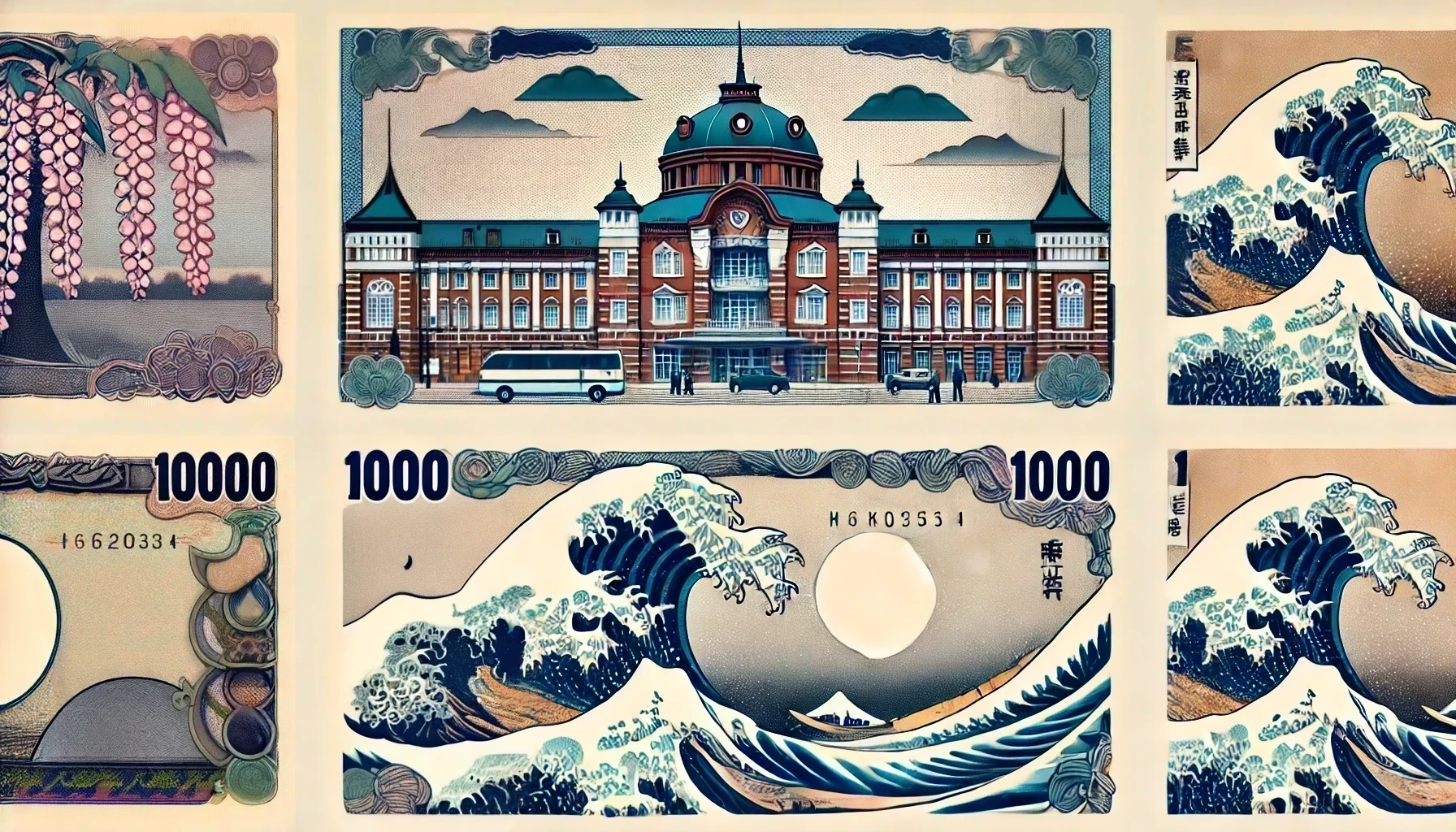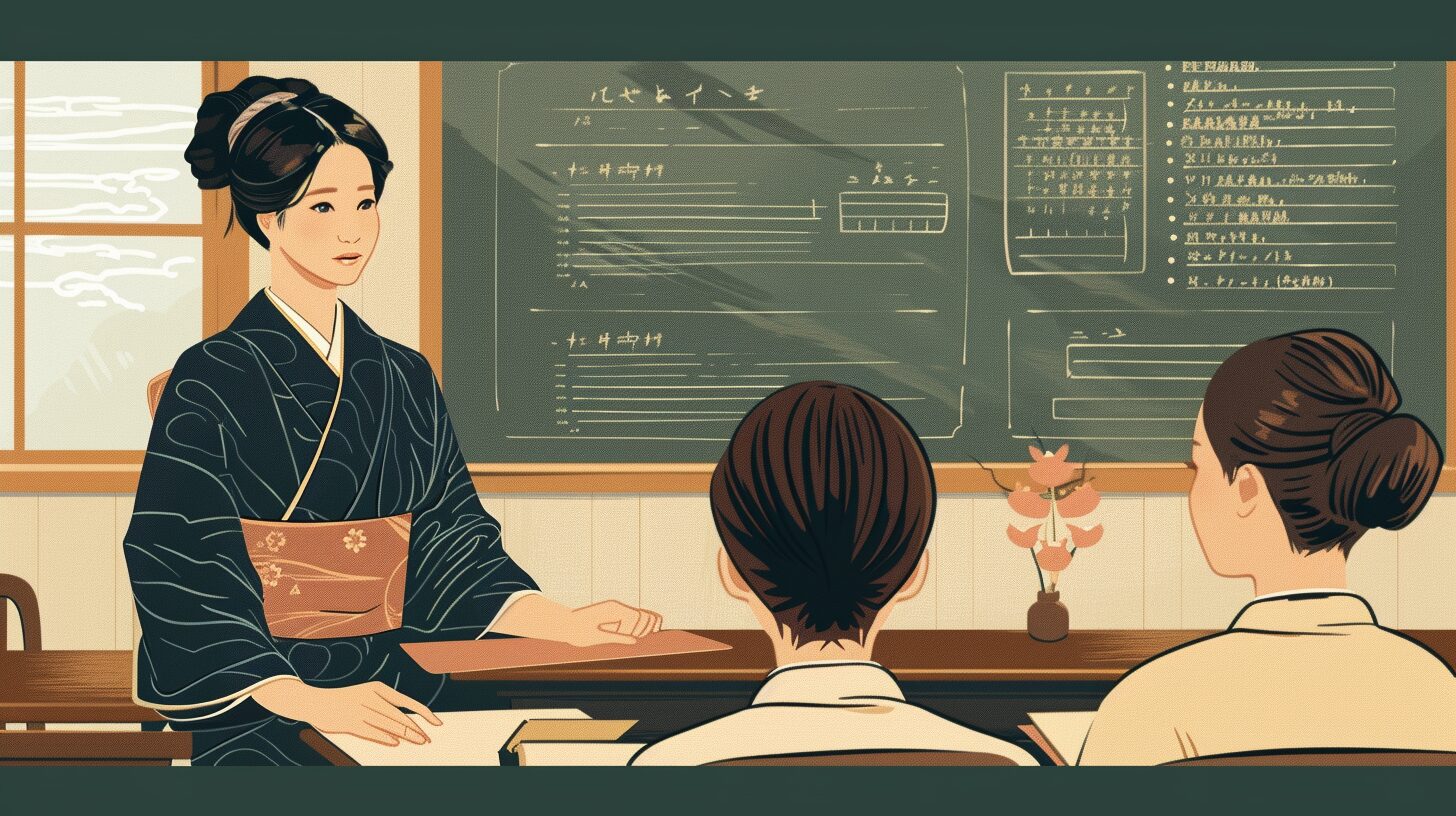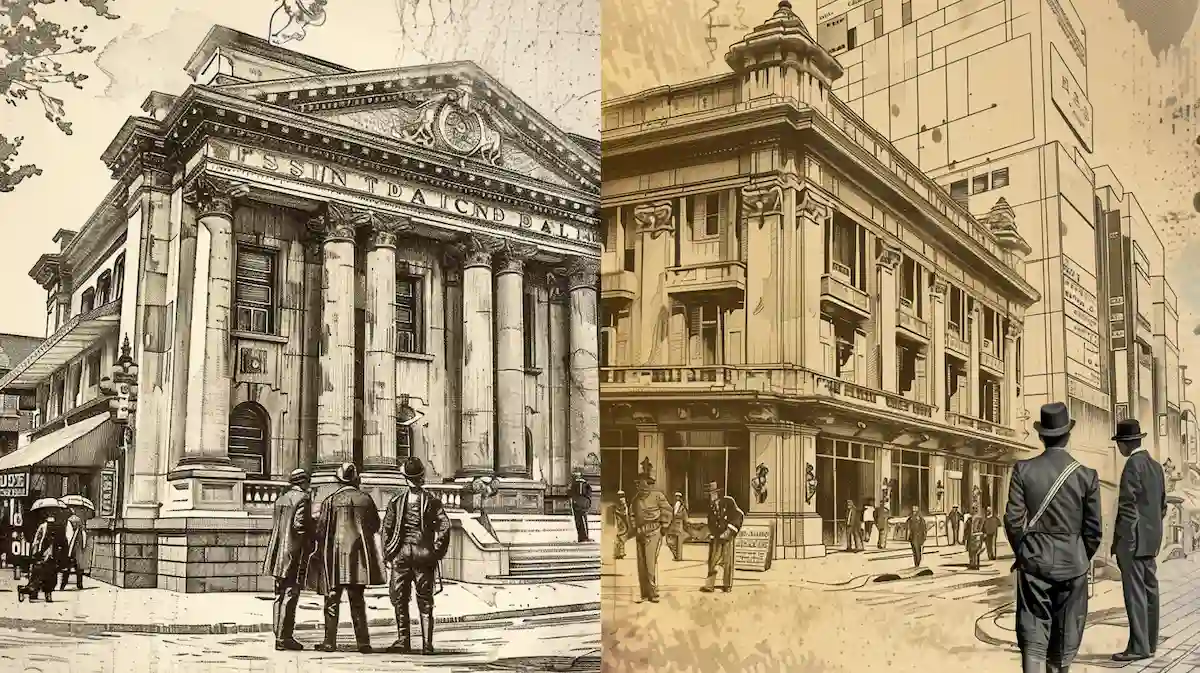渋沢栄一を英語で説明・紹介するための基本情報と、英会話に役立つ表現をシンプルでわかりやすい英語で紹介します。
英会話ダイアローグ・関連情報・10の質問を通して、渋沢栄一に関する英語表現を学びます。
英語
英会話ダイアローグを読む前に知っておくと良い前提知識と情報は以下の通りです。
- 渋沢栄一(1840-1931)
- 明治時代の実業家、政治家。「日本資本主義の父」と呼ばれる
- 2024年7月3日に発行された新1万円札の肖像画に渋沢栄一が選ばれた
- 主要な功績
- 第一国立銀行の設立: 1873年に設立され、日本初の近代的な銀行として機能
- 東京証券取引所の設立: 1878年に設立され、日本の株式市場の中心となった
- 約500社の企業設立:東京ガスや日本郵船などの設立に関わった
- 哲学「論語と算盤」
- 渋沢は、儒教の倫理(論語)と経済活動(算盤)を融合させることを提唱
- 社会貢献活動
- 教育機関や病院の設立支援、日本赤十字社への貢献など
- パリ万博(1867年)
- 渋沢が参加し、近代化の重要性を認識するきっかけとなった
2人が渋沢栄一について話しています。
渋沢栄一が「日本資本主義の父」として知られ、第一国立銀行や東京証券取引所の設立など日本の近代経済の発展に大きく貢献したことや、新紙幣の肖像に選ばれたことなどを話題にしています。
会話 / dialogue

Hey Key, have you heard about Eiichi Shibusawa?

Yeah, I’ve heard of him. He’s quite famous as the “father of Japanese capitalism,” right? What got you interested in him?

I recently learned that he’s on the new 10,000 yen banknote. It made me curious about his life and achievements.

That’s right! The new banknotes were issued on July 3, 2024. Shibusawa’s contributions to modernizing Japan’s economy are significant. He founded the First National Bank and the Tokyo Stock Exchange.

That’s impressive. I read he was involved in establishing about 500 companies. Do you know which ones?

Yes, some of the notable ones include Tokyo Gas and Nippon Yusen. He was instrumental in developing Japan’s financial and industrial sectors.

He must have been a visionary. I also found out about his philosophy, “The Analects and the Abacus.” What’s that about?

It’s an interesting concept. Shibusawa believed in integrating Confucian ethics with business practices. He thought that business should not just be about making money but also about serving society ethically.

That’s a powerful idea. It’s fascinating how he balanced morality and economics. I also came across one of his quotes: “Theory without practice is empty; practice without theory is dangerous.” What does that mean?

It means that theoretical knowledge is useless without practical application, and practical actions without proper planning and theory can be risky. He emphasized the importance of combining both.

Makes sense. Did he contribute to social causes as well?

Absolutely. He was very active in social welfare. He helped establish schools and hospitals, like his support for educational institutions and the Japan Red Cross.

I read somewhere that he believed “society is one big family.” How did he apply that idea?

He promoted cooperation and mutual support among people and businesses. He believed that everyone should work together for the common good, just like a family.

That’s inspiring. Do you know any specific episodes from his life that stand out?

One famous episode is his trip to the Paris Exposition in 1867. It broadened his perspective and inspired many of his ideas for modernizing Japan’s economy.

Interesting! It’s incredible how much he achieved in his lifetime. No wonder he’s still celebrated today.

Indeed. His legacy continues to influence Japanese society and business practices. Learning about him gives us valuable lessons in both ethics and economics.

Thanks for sharing all this, Key. I feel like I have a much better understanding of Eiichi Shibusawa now.

Anytime, Mack. He’s definitely someone worth learning about.
関連情報 / related information
「渋沢栄一」について、理解を深めるための「英語での関連情報」です。
渋沢栄一

Who is Eiichi Shibusawa?
Eiichi Shibusawa (1840-1931) is known as the “father of Japanese capitalism.” He played a major role in modernizing Japan’s economy. Shibusawa helped establish many important companies and organizations that are still significant today. His work laid the foundation for Japan’s modern financial system.
Major Achievements
Shibusawa founded the First National Bank in 1873, which was Japan’s first modern bank. He also helped create the Tokyo Stock Exchange in 1878, a central place for trading stocks and securities. Additionally, he was involved in founding Tokyo Gas and Nippon Yusen (NYK Line), which are major companies in Japan’s economy.
Philosophy – “The Analects and the Abacus”
Shibusawa believed in combining Confucian ethics (the Analects) with business practices (the Abacus). He thought that business should not only focus on making money but also serve society ethically. This philosophy emphasized the importance of balancing morality and economics, and it influenced many Japanese businesses.
Social Contributions
Shibusawa was active in social welfare. He supported the establishment of schools and hospitals. He helped educational institutions and organizations like the Japan Red Cross. He believed that businesses should contribute to the well-being of society, not just pursue profits.
Legacy on the New Banknote
In recognition of his lasting impact, Shibusawa’s portrait is on the new 10,000 yen banknote, issued on July 3, 2024. This honors his contributions to Japan’s economic and social development. His ideas and efforts continue to influence Japan today.
10の質問 / 10 questions
「渋沢栄一」について、理解を深めるための「英語での10の質問」です。
1: Who is Eiichi Shibusawa?
Eiichi Shibusawa was a Japanese businessman known as the "father of Japanese capitalism." He helped modernize Japan's economy by establishing many companies and financial institutions, such as the First National Bank and Tokyo Stock Exchange.
2: Why is Eiichi Shibusawa called the "father of Japanese capitalism"?
He earned this title because he played a crucial role in developing Japan's modern economic system by founding banks, stock exchanges, and many companies that were essential for industrial growth.
3: What is the First National Bank of Japan?
The First National Bank, founded by Eiichi Shibusawa in 1873, was Japan’s first modern bank. It helped establish Japan’s banking system and provided financial stability during the country's modernization.
4: What is the Tokyo Stock Exchange?
The Tokyo Stock Exchange, established with Shibusawa's help in 1878, is a major marketplace where stocks and other securities are traded. It became central to Japan’s economic development.
5: What is Shibusawa's philosophy "The Analects and the Abacus" about?
"The Analects and the Abacus" is Shibusawa's philosophy that combines Confucian ethics (moral values) with business practices. He believed businesses should not only seek profit but also act ethically to benefit society.
6: How did Eiichi Shibusawa contribute to social welfare?
Shibusawa supported the creation of schools, hospitals, and charitable organizations. He believed that businesses should help improve society, not just focus on profit.
7: Why is Eiichi Shibusawa on the new 10,000 yen banknote?
Shibusawa is featured on the new 10,000 yen note to honor his contributions to Japan's economy and society. His efforts in modernizing Japan have left a lasting legacy.
8: What are some companies Shibusawa helped establish?
Shibusawa helped found many companies, including Tokyo Gas, Nippon Yusen (a shipping company), and Oji Paper, which are still important in Japan today.
9: What role did Shibusawa play in the Paris Exposition of 1867?
Shibusawa attended the Paris Exposition in 1867, where he was inspired by Western industrial advancements. This experience influenced his ideas for modernizing Japan’s economy.
10: What is one of Shibusawa's famous quotes, and what does it mean?
One of his famous quotes is, "Theory without practice is empty; practice without theory is dangerous." It means that theory and practice must be balanced for success.
和訳付
会話 / dialogue

Hey Key, have you heard about Eiichi Shibusawa?
やあキー、渋沢栄一って聞いたことある?

Yeah, I’ve heard of him. He’s quite famous as the “father of Japanese capitalism,” right? What got you interested in him?
うん、知ってるよ。「日本資本主義の父」として有名だよね?どうして彼に興味を持ったの?

I recently learned that he’s on the new 10,000 yen banknote. It made me curious about his life and achievements.
最近、新しい1万円札に彼が載ることを知ったんだ。それで彼の人生や業績に興味を持ったんだよ。

That’s right! The new banknotes were issued on July 3, 2024. Shibusawa’s contributions to modernizing Japan’s economy are significant. He founded the First National Bank and the Tokyo Stock Exchange.
そうだね!新しい紙幣は2024年7月3日に発行されたんだ。渋沢の日本経済の近代化への貢献は大きいよ。第一国立銀行や東京証券取引所を設立したんだよ。

That’s impressive. I read he was involved in establishing about 500 companies. Do you know which ones?
すごいね。約500社の会社設立に関わったって読んだんだけど、どんな会社か知ってる?

Yes, some of the notable ones include Tokyo Gas and Nippon Yusen. He was instrumental in developing Japan’s financial and industrial sectors.
うん、有名なところだと東京ガスや日本郵船があるよ。日本の金融や産業分野の発展に大きな役割を果たしたんだ。

He must have been a visionary. I also found out about his philosophy, “The Analects and the Abacus.” What’s that about?
先見の明がある人だったんだね。彼の「論語と算盤」という哲学についても知ったんだけど、それって何?

It’s an interesting concept. Shibusawa believed in integrating Confucian ethics with business practices. He thought that business should not just be about making money but also about serving society ethically.
面白い考え方だよね。渋沢は儒教の倫理観をビジネスに取り入れるべきだと考えたんだ。ビジネスは単にお金を稼ぐだけじゃなく、倫理的に社会に貢献すべきだと考えていたんだよ。

That’s a powerful idea. It’s fascinating how he balanced morality and economics. I also came across one of his quotes: “Theory without practice is empty; practice without theory is dangerous.” What does that mean?
強い考え方だね。道徳と経済のバランスをとっていたのが興味深いよ。彼の言葉で「理論なき実践は空虚、実践なき理論は危険」というのも見つけたんだけど、これはどういう意味?

It means that theoretical knowledge is useless without practical application, and practical actions without proper planning and theory can be risky. He emphasized the importance of combining both.
それは、実践なしの理論的知識は無意味で、適切な計画や理論なしの実践行動は危険だってことだよ。両方を組み合わせることの重要性を強調していたんだ。

Makes sense. Did he contribute to social causes as well?
なるほどね。社会貢献活動もしていたの?

Absolutely. He was very active in social welfare. He helped establish schools and hospitals, like his support for educational institutions and the Japan Red Cross.
もちろんだよ。社会福祉に非常に積極的だったんだ。学校や病院の設立を支援して、教育機関や日本赤十字社なんかをサポートしたんだよ。

I read somewhere that he believed “society is one big family.” How did he apply that idea?
「社会は大きな家族」って考えていたって読んだんだけど、その考えをどう実践していたの?

He promoted cooperation and mutual support among people and businesses. He believed that everyone should work together for the common good, just like a family.
人々や企業間の協力と相互支援を促進していたんだ。家族のように、みんなが共通の利益のために協力すべきだと信じていたんだよ。

That’s inspiring. Do you know any specific episodes from his life that stand out?
感動的だね。彼の人生で特に印象的なエピソードって知ってる?

One famous episode is his trip to the Paris Exposition in 1867. It broadened his perspective and inspired many of his ideas for modernizing Japan’s economy.
有名なエピソードの一つに、1867年のパリ万博への旅行があるよ。それで視野が広がって、日本経済の近代化に関する多くのアイデアを得たんだ。

Interesting! It’s incredible how much he achieved in his lifetime. No wonder he’s still celebrated today.
面白いね!生涯でたくさんのことを成し遂げたんだね。今でも尊敬されているのも納得だよ。

Indeed. His legacy continues to influence Japanese society and business practices. Learning about him gives us valuable lessons in both ethics and economics.
そうだね。彼の遺産は今でも日本の社会やビジネスに影響を与え続けているんだ。彼について学ぶことで、倫理と経済の両面で貴重な教訓を得られるよ。

Thanks for sharing all this, Key. I feel like I have a much better understanding of Eiichi Shibusawa now.
いろいろ教えてくれてありがとう、Key。渋沢栄一のことがよく分かった気がするよ。

Anytime, Mack. He’s definitely someone worth learning about.
いつでもどうぞ、マック。彼は間違いなく学ぶ価値のある人物だよ。
関連情報 / related information
渋沢栄一

Who is Eiichi Shibusawa?
Eiichi Shibusawa (1840-1931) is known as the “father of Japanese capitalism.” He played a major role in modernizing Japan’s economy. Shibusawa helped establish many important companies and organizations that are still significant today. His work laid the foundation for Japan’s modern financial system.
渋沢栄一(1840-1931)は「日本資本主義の父」として知られています。彼は日本の経済を近代化する上で重要な役割を果たしました。渋沢は多くの重要な企業や団体の設立を助け、今日でも重要な存在となっています。彼の業績は日本の現代金融システムの基礎を築きました。
Major Achievements
Shibusawa founded the First National Bank in 1873, which was Japan’s first modern bank. He also helped create the Tokyo Stock Exchange in 1878, a central place for trading stocks and securities. Additionally, he was involved in founding Tokyo Gas and Nippon Yusen, which are major companies in Japan’s economy.
渋沢は1873年に日本初の近代的な銀行である第一国立銀行を設立しました。また、1878年には東京証券取引所の設立に貢献し、株式や証券の取引の中心地となりました。さらに、東京ガスや日本郵船の設立にも関与し、これらは日本経済の主要な企業です。
Philosophy – “The Analects and the Abacus”
Shibusawa believed in combining Confucian ethics (the Analects) with business practices (the Abacus). He thought that business should not only focus on making money but also serve society ethically. This philosophy emphasized the importance of balancing morality and economics, and it influenced many Japanese businesses.
渋沢は儒教の倫理(論語)とビジネス実務(算盤)を統合することを信じていました。彼はビジネスはお金を稼ぐだけでなく、道徳的に社会に奉仕すべきだと考えていました。この哲学は道徳と経済のバランスの重要性を強調し、多くの日本企業に影響を与えました。
Social Contributions
Shibusawa was active in social welfare. He supported the establishment of schools and hospitals. He helped educational institutions and organizations like the Japan Red Cross. He believed that businesses should contribute to the well-being of society, not just pursue profits.
渋沢は社会福祉にも積極的に関与していました。彼は学校や病院の設立を支援しました。教育機関や日本赤十字社のような組織を支援しました。彼は企業は利益を追求するだけでなく、社会の福祉にも貢献すべきだと信じていました。
Legacy on the New Banknote
In recognition of his lasting impact, Shibusawa’s portrait is on the new 10,000 yen banknote, issued on July 3, 2024. This honors his contributions to Japan’s economic and social development. His ideas and efforts continue to influence Japan today.
彼の持続的な影響を認識して、渋沢の肖像が2024年7月3日に発行された新しい1万円札に描かれています。これは彼の日本の経済と社会の発展への貢献を称えるものです。彼の思想と努力は今日の日本にも影響を与え続けています。
10の質問 / 10 questions
1: Who is Eiichi Shibusawa?
渋沢栄一とは誰ですか?
Eiichi Shibusawa was a Japanese businessman known as the "father of Japanese capitalism." He helped modernize Japan's economy by establishing many companies and financial institutions, such as the First National Bank and Tokyo Stock Exchange.
渋沢栄一は「日本資本主義の父」として知られる日本の実業家です。彼は第一国立銀行や東京証券取引所など、多くの企業や金融機関を設立し、日本の経済を近代化しました。
2: Why is Eiichi Shibusawa called the "father of Japanese capitalism"?
なぜ渋沢栄一は「日本資本主義の父」と呼ばれるのですか?
He earned this title because he played a crucial role in developing Japan's modern economic system by founding banks, stock exchanges, and many companies that were essential for industrial growth.
彼は銀行や証券取引所、そして産業発展に不可欠な多くの企業を設立し、日本の近代経済システムの発展に大きな役割を果たしたため、「日本資本主義の父」と呼ばれています。
3: What is the First National Bank of Japan?
第一国立銀行とは何ですか?
The First National Bank, founded by Eiichi Shibusawa in 1873, was Japan’s first modern bank. It helped establish Japan’s banking system and provided financial stability during the country's modernization.
第一国立銀行は、渋沢栄一が1873年に設立した日本初の近代的な銀行です。日本の銀行制度の確立に貢献し、近代化の過程で金融の安定を提供しました。
4: What is the Tokyo Stock Exchange?
東京証券取引所とは何ですか?
The Tokyo Stock Exchange, established with Shibusawa's help in 1878, is a major marketplace where stocks and other securities are traded. It became central to Japan’s economic development.
東京証券取引所は1878年に渋沢の助けを得て設立され、株式やその他の証券が取引される主要な市場です。日本の経済発展の中心的な役割を果たしました。
5: What is Shibusawa's philosophy "The Analects and the Abacus" about?
渋沢の「論語と算盤」とはどのような哲学ですか?
"The Analects and the Abacus" is Shibusawa's philosophy that combines Confucian ethics (moral values) with business practices. He believed businesses should not only seek profit but also act ethically to benefit society.
「論語と算盤」は、儒教の倫理(道徳)とビジネスの実務を組み合わせた渋沢の哲学です。彼はビジネスが利益を追求するだけでなく、社会に利益をもたらすために道徳的に行動すべきだと信じていました。
6: How did Eiichi Shibusawa contribute to social welfare?
渋沢栄一は社会福祉にどのように貢献しましたか?
Shibusawa supported the creation of schools, hospitals, and charitable organizations. He believed that businesses should help improve society, not just focus on profit.
渋沢は学校、病院、慈善団体の設立を支援しました。彼は、ビジネスが利益だけに注力するのではなく、社会の改善にも貢献すべきだと信じていました。
7: Why is Eiichi Shibusawa on the new 10,000 yen banknote?
なぜ渋沢栄一は新しい1万円札に描かれているのですか?
Shibusawa is featured on the new 10,000 yen note to honor his contributions to Japan's economy and society. His efforts in modernizing Japan have left a lasting legacy.
渋沢栄一は、日本の経済と社会への貢献を称えるため、新しい1万円札に描かれています。彼の日本の近代化への努力は今も続く遺産を残しています。
8: What are some companies Shibusawa helped establish?
渋沢栄一が設立に関与した企業にはどのようなものがありますか?
Shibusawa helped found many companies, including Tokyo Gas, Nippon Yusen (a shipping company), and Oji Paper, which are still important in Japan today.
渋沢は東京ガス、日本郵船(海運会社)、王子製紙など、今でも日本で重要な役割を果たしている多くの企業の設立に関与しました。
9: What role did Shibusawa play in the Paris Exposition of 1867?
渋沢栄一は1867年のパリ万国博覧会でどのような役割を果たしましたか?
Shibusawa attended the Paris Exposition in 1867, where he was inspired by Western industrial advancements. This experience influenced his ideas for modernizing Japan’s economy.
渋沢は1867年のパリ万国博覧会に出席し、西洋の産業発展に感銘を受けました。この経験が彼の日本の経済近代化への考えに影響を与えました。
10: What is one of Shibusawa's famous quotes, and what does it mean?
渋沢栄一の有名な言葉の一つとその意味を教えてください。
One of his famous quotes is, "Theory without practice is empty; practice without theory is dangerous." It means that theory and practice must be balanced for success.
彼の有名な言葉の一つに「実行なき理論は空虚であり、理論なき実行は危険である」というものがあります。それは、成功には理論と実践のバランスが必要だという意味です。
words & phrases
英会話ダイアローグと関連情報に出てきた単語・フレーズです(例文は各3つ)。

be involved in : 熟語
意味: 〜に関与する、参加する。To take part in or be a part of an activity or event.
(渋沢栄一が多くの企業の設立に関与したことを指す)
例文:
He is involved in several community projects.
「彼は複数の地域プロジェクトに関与しています。」
She was deeply involved in the decision-making process.
「彼女は意思決定プロセスに深く関与していました。」
Many employees are involved in the new project.
「多くの従業員が新しいプロジェクトに関与しています。」
instrumental : 形容詞
意味: 重要な役割を果たす、手段となる。Serving as an instrument or means in a process.
(渋沢栄一が日本の金融と産業部門の発展に重要な役割を果たしたことを指す)
例文:
He was instrumental in developing the new software.
「彼は新しいソフトウェアの開発において重要な役割を果たしました。」
Her advice was instrumental in our success.
「彼女のアドバイスは私たちの成功において重要なものでした。」
The manager was instrumental in improving team morale.
「マネージャーはチームの士気を向上させる上で重要な役割を果たしました。」
visionary : 形容詞
意味: 先見の明のある、未来を見据えた。Having or showing clear ideas about what should happen or be done in the future.
(渋沢栄一が先見の明を持っていたことを指す)
例文:
The CEO is a visionary leader.
「CEOは先見の明のあるリーダーです。」
His visionary ideas changed the industry.
「彼の先見の明のあるアイデアは業界を変えました。」
She is known for her visionary thinking.
「彼女は先見の明のある考え方で知られています。」
modernize : 動詞
意味: 近代化する、現代風にする。To make something more modern or up-to-date.
(渋沢栄一が日本の経済を近代化したことを指す)
例文:
The government plans to modernize the railway system.
「政府は鉄道システムを近代化する計画です。」
They modernized the old building.
「彼らは古い建物を近代化しました。」
The company is working to modernize its operations.
「その会社は業務を近代化するために取り組んでいます。」
honor : 動詞
意味: 敬意を表する、栄誉を授ける。To show respect for or give recognition to someone or something.
(渋沢栄一の貢献を称えるために新しい紙幣に肖像が使われたことを指す)
例文:
They honored him with a special award.
「彼らは特別な賞で彼を称えました。」
The city honored the hero with a parade.
「市はパレードで英雄を称えました。」
She was honored for her contributions to the community.
「彼女は地域社会への貢献で称えられました。」
詳細情報 / Further Info
関連記事(新紙幣、津田梅子、北里柴三郎)



